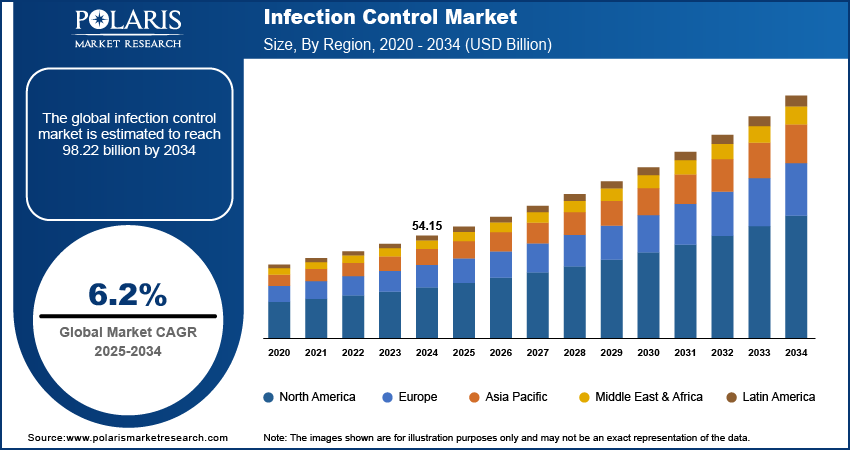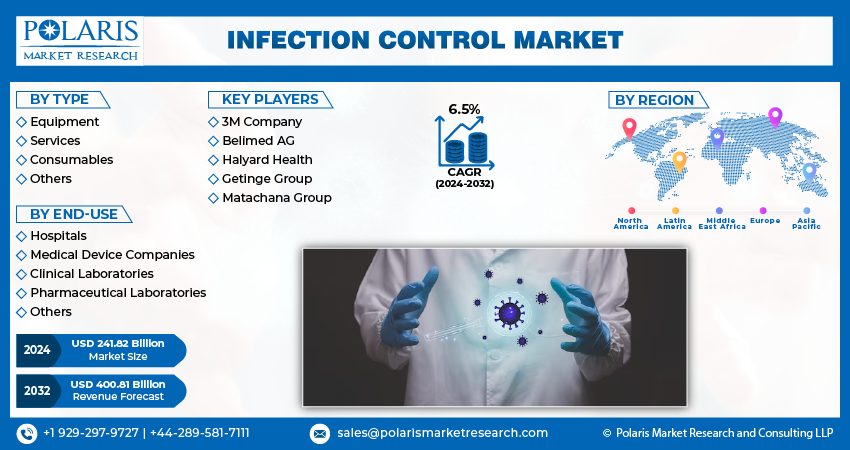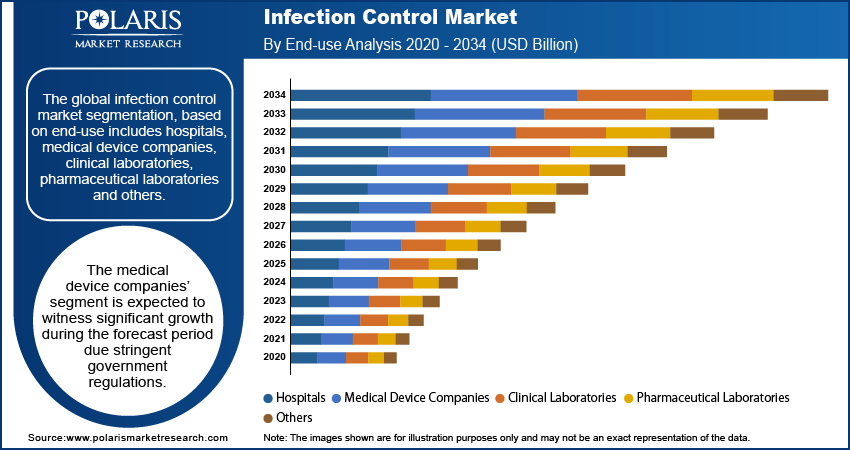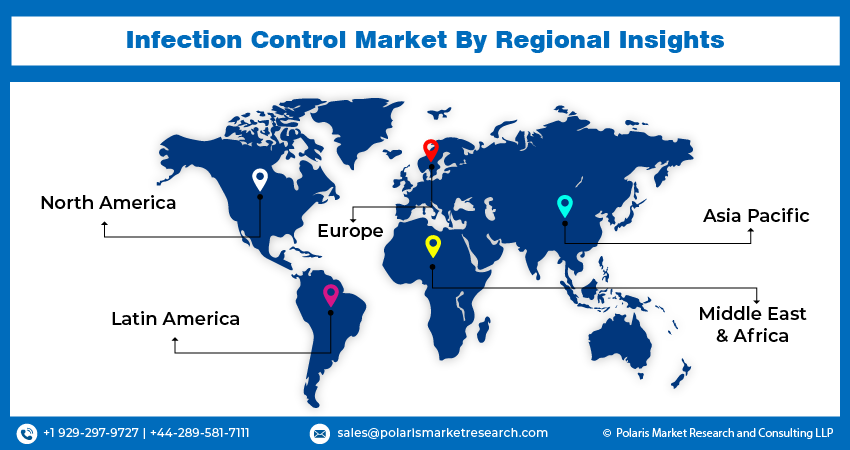
Infection Control Market Size, Share, Trends, & Industry Analysis Report
By Type (Equipment, Services), End-use, By Region – Market Forecast, 2025–2034
- Published Date:Oct-2025
- Pages: 116
- Format: PDF
- Report ID: PM3241
- Base Year: 2024
- Historical Data: 2020-2023
What is Infection Control Market Size?
The global infection control market size and share was valued at USD 54.15 billion in 2024 and is expected to grow at a CAGR of 6.2% during the forecast period. The market is driven by the increase of surgical procedures that demand intensive infection control. The increasing involvement of government agencies in the process of issuing guidelines to raise global awareness of effective prevention strategies is anticipated to contribute to market expansion over the forecast period.
Key Insights
- The medical device companies’ segment is expected to witness significant growth during the forecast period due stringent government regulations.
- The consumables dominated with largest share in 2024 due to its frequent use and limited product lifespans.
- North America dominated with largest share in 2024 due to strategic collaborations adopted by key market players.
- Asia Pacific is projected to accounted for a significant share in the global market due to rapid development of healthcare infrastructure.
Industry Dynamics
- The growing geriatric population is fueling the market growth.
- The growth in cases of hospital-acquired infections is driving the growth.
- The technological advancement is boosting the industry growth.
- High costs of advanced infection control equipment and implementation limit the growth.
Market Statistics
- 2024 Market Size: USD 54.15 Billion
- 2034 Projected Market Size: USD 98.22 Billion
- CAGR (2025-2034): 6.2%
- Largest Market: North America

To Understand More About this Research: Request a Free Sample Report
Infection control is an academic sub-discipline of epidemiology concerned with the prevention or stopping of the spread of infections in healthcare facilities. It incorporates several policies and procedures aimed at reducing infection rates in hospitals and other healthcare settings. Depending on the microorganism, specific precautions are needed to prevent infection transmission. The indications for transmission-based precautions can take the form of standard precautions, contact precautions, droplet precautions, and airborne precautions. Standard precautions, which include hand hygiene, apt patient placement, and personal protective equipment, are used for all patient care. Contact precautions are used for patients with known or suspected infections that can be transmitted via contact. In contrast, droplet precautions are used for patients with suspected or known infections that can be transmitted via air droplets. As such, healthcare facilities need to have the apt equipment to implement the standard precautions for all patients.
Acute Respiratory Disorders (ARDs) are one of the main reasons for high mortality rates globally, according to data released by WHO. A whopping 4.0 million people die each year as a result of ARDs. The tremendous requirement for strict prevention and control is demonstrated by the data. Most hospital-acquired infections are caused by diseases like pneumonia and infections of the bloodstream, urinary tract, surgical site, and MRSA. Other significant hospital-acquired infections (HAI) include pneumonia linked to ventilators, catheter-related bloodstreams, and catheter-associated urinary tract infections. One of the main issues, which impacts patient recovery and has a significant effect on death rates internationally, is thought to be HAI.
The increase in hospitalization time for surgical infections was determined to be about 8 days, according to the WHO's practical guide on the prevention of HAI. The overall expenditures associated with hospitalization are expected to increase significantly as a result of these extended stays, which increases the clinical urgency for adopting infection prevention strategies. As a result of the excessive use of resources to treat the acquired infection, it is assumed that lengthy hospital stays are also not cost-effective for hospitals and healthcare payers.
The global infection control market is competitive and moderately fragmented. To increase their market share, industry participants are concentrating on new product releases, product developments, and global growth. Fortive (Advanced Sterilization Products), 3M Company, Getinge AB, Steris PLC, and Cantel Medical Corporation are some of the major market participants active in the market.
Industry Dynamics
What are the Factors Driving Infection Control Market Growth?
Age-related population growth has been a notable trend in recent years. Older people are more susceptible to developing a variety of chronic diseases, including cancer, arthritis, chronic obstructive pulmonary disease (COPD), dementias, neurovascular diseases, and others. Those who are elderly are also more susceptible to hospital-acquired infections. This sizable group of senior citizens is prone to various chronic diseases, necessitating the use of infection control solutions while receiving treatment. As a result, as the world's elderly population rises, so does the demand for infection control solutions, driving the infection control market growth.
Medical equipment and pharmaceutical packaging materials are frequently sterilized by e-beam irradiation, sometimes referred to as beta irradiation. Very dense materials should not be used for this sterilization; low to medium density items work best. It advantages from clean, simple on/off technology and quick switch terminal sterilization. Radiation compatibility issues cannot occur since products can be sterilized using an e-beam for a short time. E-beam sterilizing reduces handling and related dangers and often takes five to seven minutes to finish. As a result, it is projected that the infection control market would develop significantly over the course of the forecast period.
Hospital-acquired infections (HAIs) are nosocomial infections that occur during a patient's stay at hospitals and related facilities and are not observed at the time of admission. They are a major cause of morbidity and mortality worldwide. These infections are primarily hospital-acquired pneumonia infections, central line-associated bloodstream infections, surgical-site infections, catheter-associated urinary tract infections, Clostridium difficile infections, and ventilator-associated pneumonia. One of the major causes of HAIs is the use of infected medical devices during diagnostic and therapeutic procedures.

Report Segmentation
The market is primarily segmented based on type, end-use, and region.
|
By Type |
By End-use |
By Region |
|
|
|
Know more about this report: Request for sample pages
Why Consumables Dominated with Largest Share in 2024?
Consumables segment dominated with largest share in 2024 due to their frequent use and limited product lifespans. Consumables are used frequently in sterilization, disinfection, and other control operations and are a necessary component of those treatments, therefore they make up a bigger portion of the total. As of 2022, personal protection equipment had a sizable percentage under consumables. Many healthcare organizations are arguing for and raising awareness of the advantages of personal protection equipment, which is expected to account for a sizeable percentage, thereby driving the segment growth.
Which Segment by End Use is Expected to Witness Significant Growth?
The medical device companies is expected to witness significant growth during the forecast period due to stringent government regulation on sterility. Regulatory bodies such as FDA, EMA, ISO have implemented more stringent sterilization and hygiene protocols due to which the demand for infection control in the medical device manufacturing industries is rising. Moreover, rising number of minimally invasive surgeries is further driving the demand for the sterile medical equipment, which in turn is driving the demand for the infection control in the medical device companies, thereby driving the segment growth.

How North America Captured Largest Share in 2024?
The North America dominated with largest share in 2024 due to a steady number of strategic collaborations adopted by key market players to expand their product range and infection control capabilities. Also, the established businesses' increased efforts to expand their presence throughout this region are to blame for North America's leading market share. Due to the rising number of outsourcing companies, rising healthcare spending, and significant changes in healthcare infrastructure, the demand in North America is growing at the quickest rate throughout the forecast period, thereby driving the industry growth.
What are the Reasons for Asia Pacific’s Significant Growth?
The Asia Pacific is expected to witness significant growth during the forecast period due to rapid development of healthcare infrastructure. The government in the major developed and developing countries such as India, China, and Japan and actively investing in the healthcare sector to improve and expand the healthcare infrastructure, this increase in the investment is fueling the demand for the infection control services and solution in the region. Moreover, rising incidence of healthcare associated infection is fueling the awareness regarding the proper sanitization of healthcare premises and equipment used in wide range of procedures, which is further driving the demand, thereby driving the growth in the Asia Pacific region.

Competitive Insight
Some of the major players operating in the global infection control market include 3M Company, Belimed AG, Halyard Health, Getinge Group, Matachana Group etc.
Recent Developments
- January 2025, DDC launched three advanced infection-control products, including the Pulpmatic Flex macerator, UVMATIC MultiTower disinfection system, and UVMATIC® AirSafe Steriliser, enhancing protection in hospitals and care homes with energy-efficient, UVC, and multi-stage air purification technologies.
Infection Control Market Report Scope
|
Report Attributes |
Details |
|
Market size in 2024 |
USD 54.15 billion |
| Market size in 2025 | USD 57.40 billion |
|
Revenue Forecast in 2034 |
USD 98.22 billion |
|
CAGR |
6.2% from 2025 - 2034 |
|
Base year |
2024 |
|
Historical data |
2020 – 2023 |
|
Forecast period |
2025 - 2034 |
|
Quantitative units |
Revenue in USD billion and CAGR from 2025 to 2034 |
|
Segments Covered |
By Type, By End-use, By Region |
|
Regional scope |
North America, Europe, Asia Pacific, Latin America; Middle East & Africa |
|
Key Companies |
3M Company, Belimed AG, Halyard Health, Getinge Group, Matachana Group |
We provide our clients the option to personalize the Infection Control Market report to suit their needs. By customizing the report, you can get data as per your format and definition. Also, the customization option allows you to gain a deeper dive into a specific segment, region, customer, or market competitor. Request for Report Customization Here
FAQ's
The infection control market report covering key segments are type, end-use, and region.
Infection Control Market Size Worth USD 98.22 Billion By 2034.
The global infection control market expected to grow at a CAGR of 6.2% during the forecast period.
North America is leading the global market.
key driving factors in infection control market are increase of surgical procedures that demand intensive infection control.
